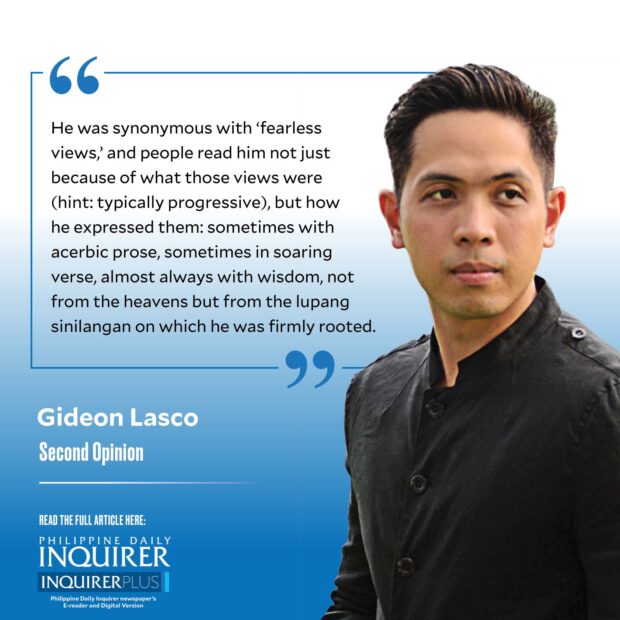Conrado de Quiros, writer and prophet

He was synonymous with “fearless views,” and people read him not just because of what those views were (hint: typically progressive), but how he expressed them: sometimes with acerbic prose, sometimes in soaring verse, almost always with wisdom, not from the heavens but from the lupang sinilangan on which he was firmly rooted. Like Nick Joaquin, he had a command of the language in ways that traversed the Shakespearean depths and heights that the title of his column alluded to.
I never had the privilege of meeting Conrado de Quiros in person; my sole acquaintance was with his black-and-white headshot and his column, which I read as a kid growing up in Los Baños. I shared this space with him only once—on Oct. 12, 2010—when I had an essay in Young Blood and he was at the zenith of his powers, saying of our “seriously evil” politicians: “I gather from Dante that God has reserved a special place in Hell for them.”
By the time I became a regular contributor in Inquirer in 2015, he had already written what would turn out to be his last column. In the years that followed, his face would still appear in these pages with the editor’s note saying he was “on leave.” “Also,” as Ma’am Chato Garcellano, our opinion editor, once told me, “so that he might see that we’re still waiting for him to come back.”
Alas, he never did, but such was the prescience of his columns that many of them could have been written for this moment. “Why should a way of life that is different from our own naturally constitute a threat to it?” He asked on Aug. 18, 1998, referring to gay couples in what could easily be a rebuke to Benny Abante, concluding: “That’s plain bigotry.” His warning against the demonization of people who use drugs on June 27, 2003, rang true in 2016 and rings true even today: “There is a drug that addles the brain more surely and swift than ‘shabu,’ as I know from seeing my friends who have gotten into government. That is unbridled power.” In his final piece, dated Sept. 23, 2014, he prophetically called for a “note of urgency not just about the horrendous reality of climate change but about the even more horrendous reality of the plight of the poor,” pointing out how, then as now, typhoons and other disasters disproportionately affect the poor.
When a journalist reaches a certain stature, there is a temptation to be more diplomatic, not wanting to offend the people who you end up hobnobbing with; at which point name-dropping becomes preferable to name-calling; pontification handier than persuasion. De Quiros never gave in to the seduction of his own fame, wielding the pen against the most powerful people in the land in unflinching and unforgettable ways: Who can forget his empty column on Jan. 5, 2004, or “Hello Garci” column on July 25, 2005? He ominously and repeatedly warned against the rise of Rodrigo Duterte, and, in response to Sara Duterte slapping the sheriff, he wrote on July 21, 2011, that it was plain wrong, just like her father’s dirty finger and foul language:
“Some things are not a matter for public acclamation. Some things may not be put to a vote. Some things are a matter of right and wrong. Burying Marcos in the Libingan ng mga Bayani is one of them. Condoning behavior like this in a public official is another. It is wrong. There are no ifs, ands or buts about it.”
Surely, this is also the moment when people will bring up his blindspots (for instance, his less-than-critical embrace of former president Benigno “Noynoy” Aquino III or P-Noy), and that is fair, for, as I have written in the past, we cannot lionize the dead. But when you lay bare your mind to the public and do so on a regular (in De Quiros’ case, almost daily) basis, you will inevitably not be right all the time, and such imperfections should not detract attention from the moral clarity and courage that suffused his decades of writing.
Moreover, like the generations who had the privilege of reading him from fresh ink, we do not need to agree with all of what he said for us to appreciate how he entertained our minds, educated our conscience, enriched our public sphere, and expanded the mundane to encompass both the messiness and the majesty of what makes us human. In his sleep, what dreams may come for the country he so loved? In parsing his work for parting words, perhaps we may find hope (“May araw din kayo,” he once said of our corrupt leaders), humor (“Magical, demented, colorful, chaotic, fun-loving, incontinent,” he once said of the Filipino spirit), and even—as in his eulogy for Cory Aquino—an epiphany:
“Maybe colors are there to unite us more than separate us. Maybe red is just the blood that pulses in the veins in love and war. Maybe yellow is just the pages of a letter from a loved one that magically bring him back to life. Maybe blue is just the sky, however cloudy, when looked at through the bars of a prison cell. Maybe green is just fields promising plenitude. Maybe black is just the tangle of our fate, the twists and turns of our life, as we grope our way forward. Maybe white is just the grace to push on, amid the darkness.”
—————-
glasco@inquirer.com.ph




















